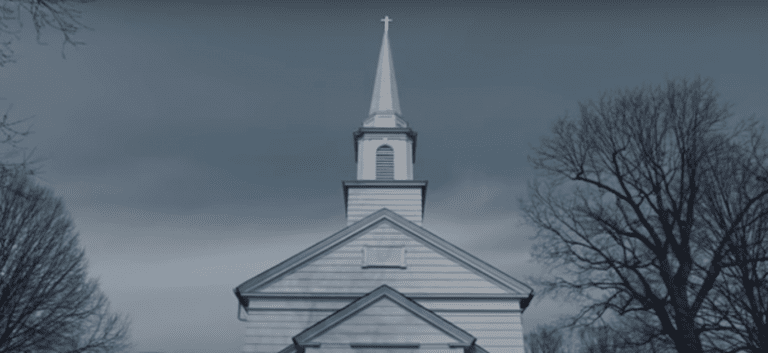
A Soulless Church
The movie opens with a shot of the First Reformed Church itself—a white, spired building set against the stormy gray clouds and bare trees of rural New York. It’s a telling visual setup for First Reformed.
For centuries, the church has stood as a shelter in a cold, gray, indifferent world, providing shelter, solace and salvation for generations untold. It wasn’t just a sanctuary for the saved, either. We’re told that the church, built in 1767, was a waystation for the Underground Railroad. You can still see the trap door in the floor, under which runaway slaves would hide.
But First Reformed is a shadow of what it used to be. The Rev. Toller (Ethan Hawke) speaks to nearly an empty sanctuary most Sundays. It’s more tourist attraction than house of worship, visitors ogling the 19th-century architecture and peering at the trap door. Some from Abundant Life, the nearby megachurch that now owns First Reformed, call the church the “souvenir shop.”
Toller swallows the snub with good grace: Without the generosity of Abundant Life, First Reformed would’ve shuttered long ago.
Still, the contrast is striking. First Reformed, an old church with a proud history of involvement in real-world problems and led by a pastor who’s known more than his fair share of suffering and guilt (his son was killed in Iraq—a war that Toller, then a military chaplain, encouraged him to go to), stands nearly empty. Abundant Life, with its massive sanctuary and litany of programs for every member of the family, peddles a feel-good, no-cost sort of Gospel. If First Reformed suggests spiritual exercise and discipline is needed to face this bitter world, Abundant Life offers spiritual comfort food: Take a load off and feel better. Don’t make waves. Don’t worry, be happy. A fair critique on many a church today, I believe.
The contrast reminds me some of Dietrich Bonhoeffer’s ideas on cheap grace:
Cheap grace is the preaching of forgiveness without requiring repentance, baptism without church discipline, Communion without confession, absolution without personal confession. Cheap grace is grace without discipleship, grace without the cross, grace without Jesus Christ, living and incarnate.
Costly grace is the treasure hidden in the field; for the sake of it a man will go and sell all that he has. It is the pearl of great price to buy which the merchant will sell all his goods. It is the kingly rule of Christ, for whose sake a man will pluck out the eye which causes him to stumble; it is the call of Jesus Christ at which the disciple leaves his nets and follows him.













